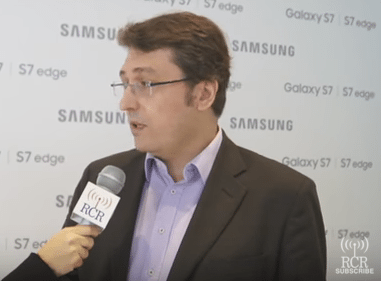Samsung expects strong push with Galaxy S7 devices into LatAm despite flat overall sales
BARCELONA, Spain – Samsung’s new Galaxy S7 and S7 Edge smartphones are schedule to be available for sale across Latin American countries by the end of March, Andre Varga, product engineering manager for Samsung Latin America, told RCR Wireless News. The company this week launched its new family of Galaxy devices at the Mobile World Congress event.
The new devices are set to hit the market in a year when Samsung expects flat sales not only in Latin America, but worldwide, mostly due to economic issues and slowing IT demand. Varga said Samsung’s 2016 mobile communications sales should perform as they did last year in the region, though Latin America is still seen with growth potential for Samsung.
Across Latin America, users have begun to switch from feature phones to smartphones, with those buyers also expected to eventually target higher-end devices.
“Samsung caters to all smartphones categories, including entry-level. Due to this, we have an advantage compared with those who focus only in the high-end products,” said Varga, adding the company has worked to keep its customers loyal to the brand.
The company has also focused on boosting its device ecosystem, engaging customers to use different gadgets while keeping them in the Samsung universe. This includes the recent launch of its Gear VR camera and glass – and partnership with Facebook – targeting “virtual reality” as the next way to connect and interact.
In a video interview with RCR Wireless News, Varga explained how Samsung is looking to lead in the VR era, the role of new devices and the partnership with Facebook. Varge also commented about the need to create an ecosystem and a culture to consume and create 360-degree, virtual reality content.
The lifecycle of smartphones has been another factor influencing sales. Varga said people are keeping the same device longer, moving from around 18 months to 24 months. This change has bolstered the sale of second-hand products, and in the Latin America it also represents an opportunity for people lacking the financial resources to purchase a new, higher-end device.
Editor’s Note: Travel costs to Mobile World Congress were provided by Samsung.

